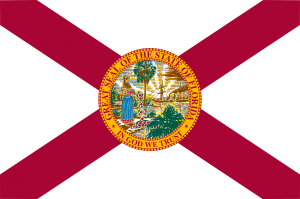 Florida governor Rick Scott yesterday approved legislation that will facilitate challenges to classroom materials, allowing any county resident to lodge a challenge against textbooks or supplemental materials that they claim fail to present “a noninflammatory, objective, and balanced viewpoint on issues.” Intellectual freedom advocates are bracing for challenges on multiple topics of public contention, from evolution and climate change to fictional works featuring Muslim or LGBTQIA characters.
Florida governor Rick Scott yesterday approved legislation that will facilitate challenges to classroom materials, allowing any county resident to lodge a challenge against textbooks or supplemental materials that they claim fail to present “a noninflammatory, objective, and balanced viewpoint on issues.” Intellectual freedom advocates are bracing for challenges on multiple topics of public contention, from evolution and climate change to fictional works featuring Muslim or LGBTQIA characters.
The bill that Gov. Scott signed without comment this week, HB 989, is a modified version of two others that failed during the 2016 legislative session. Two groups that pushed the legislation, the Florida Citizens’ Alliance and Better Collier County Public Schools, have made no effort to hide their true intention of using it in combination with a religious freedom law also passed this year in order to suppress classroom materials that include information or viewpoints with which they simply don’t agree.
Florida Citizens’ Alliance managing director Keith Flaugh told Frontline last month that the group planned to target “textbooks that demonstrate ‘bias toward Islam and seldom mention Christianity,’ and promote those that push for a Christian view of the origins of life.” He added that “Darwin’s theory is a theory, and the biblical view is a theory, and our kids should be taught both in a balanced way.”
The potential impact of outside pressure groups has likely been reduced by successive amendments that imposed stricter residency requirements on complainants, however: when the bill was originally introduced this year it would have allowed challenges from anyone who has paid sales tax in Florida. That was later amended to require legal residency in the state, and amended again so that the final version signed by Gov. Scott says residents of any given county may challenge classroom materials only in that county.
Both FCA and BCCPS, along with another group called Parents ROCK, were previously involved in a public dispute over books they claimed were included on Collier County Public Schools’ recommended summer reading lists in 2015. In fact, the lists to which they objected were found on GoodReads.com and were compiled by users unconnected to Collier County Public Schools. The CCPS website did initially include a link to a GoodReads-curated page of Middle School Book Lists, but the parent groups apparently failed to understand that the school district had no control over the content found there. After receiving complaints, CCPS removed the GoodReads link and replaced it with a list compiled by the Florida Department of Education.
Nevertheless, some parents had already cross-checked lists from GoodReads against CCPS library collections and demanded the removal of four books from school libraries: Beloved and The Bluest Eye by Toni Morrison, Dreaming in Cuban by Cristina Garcia, and Killing Mr. Griffin by Lois Duncan. (One book called Beautiful Bastard, which they found on a GoodReads list and excerpted for provocative effect in at least one blog post, was never in any CCPS libraries or classrooms at all.) Despite much social media posturing and allegations that the school district was defending “the use of highly explicit and pornographic materials,” however, the parent groups never availed themselves of the formal challenge procedure outlined in district policy.
Although that furor began over library books, HB 989 originally applied only to instructional materials used in classrooms, as defined in existing law under S. 1006.29(2). Before final passage, some sections of the bill were amended to include materials “made available in a school library,” but the exact impact is unclear since those are completely separate categories. Library materials are not subject to the public review and approval process used for adopting textbooks, for instance; such an undertaking would be impractical, not to mention likely unconstitutional. As passed, the main portion of the legislation regarding challenges starting on line 109 still appears to apply primarily to instructional materials alone, even though some subsections also mention library materials.
With the new law about to go into effect on July 1, all that can be said for now is that Sunshine State residents should prepare for an uptick in challenges to school materials and take the advice of Florida Citizens for Science, which has advocated against HB 989 and its predecessors:
Each and every one of us has to be on alert. You must keep an eye on your local school board and everyone who brings forth a complaint about textbooks. If you don’t, we truly lose. At this point the fight is at the local level. If you’re not there and willing to stand up for sound science education, then we’re done.
Given the still-nebulous potential impact of this legislation, make that sound education on any topic including science. Take a look back at our past coverage of this issue, starting with the 2015 dispute over Collier County school library books:
- Parent Group Pressures Florida School District to Ban Four Books
- Florida Bills Could Hold Education Hostage to Ideology
- Florida Classroom Censorship Bills Gone–For Now
- Collier County School Board Voters Reject Censorship Agenda
- Florida Classroom Censorship Bills Return for Second Year
- Florida Classroom Censorship Bills Pass Through Committee, Await Final Hearing Before Vote
- Florida Legislature Passes Classroom Censorship Bills
Help support CBLDF’s important First Amendment work in 2017 by visiting the Rewards Zone, making a donation, or becoming a member of CBLDF!
Contributing Editor Maren Williams is a reference librarian who enjoys free speech and rescue dogs.